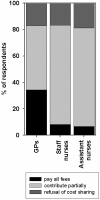Planning training seminars in palliative care: a cross-sectional survey on the preferences of general practitioners and nurses in Austria
- PMID: 20540757
- PMCID: PMC2893516
- DOI: 10.1186/1472-6920-10-43
Planning training seminars in palliative care: a cross-sectional survey on the preferences of general practitioners and nurses in Austria
Abstract
Background: Training in palliative care is frequently requested by health care professionals. However, little is known in detail about the subject matters and the educational preferences of physicians and staff or assistant nurses in this field.
Methods: All 897 registered GPs and all 933 registered home care nurses in the district of Steiermark/Austria were sent postal questionnaires.
Results: Results from 546 (30%) respondents revealed that GPs prefer evening courses and weekend seminars, whereas staff and assistant nurses prefer one-day courses. Multidisciplinary sessions are preferred by almost 80% of all professional groups. GPs preferred multi disciplinary groups most frequently when addressing psychosocial needs (88.8%) and ethical questions (85.8%). Staff and assistant nurses preferred multidisciplinary groups most frequently in the area of pain management (88%) and opted for multi disciplinary learning to a significantly higher extent than GPs (69%; p < 0.01). Those topics were ranked first which are not only deepening, but supplementing the professional training. On average, GPs were willing to spend a maximum amount of euro 400 per year for training seminars in palliative care, whereas nurses would spend approximately euro 190 for such classes.The results provide a detailed analysis of the preferences of GPs and nurses and offer guidance for the organisation of training seminars in palliative care.
Conclusions: Medical and nursing education programs often pursue separate paths. Yet our findings indicate that in palliative care multidisciplinary training seminars are favoured by both, doctors and nurses. Also, both groups prefer topics that are not only deepening, but supplementing their professional knowledge.
Figures




Similar articles
-
Competency and educational needs in palliative care.Wien Klin Wochenschr. 2007;119(3-4):112-6. doi: 10.1007/s00508-006-0724-9. Wien Klin Wochenschr. 2007. PMID: 17347860
-
Preparing palliative home care nurses to act as facilitators for physicians' learning: Evaluation of a training programme.Palliat Med. 2015 May;29(5):458-63. doi: 10.1177/0269216314560391. Epub 2014 Dec 18. Palliat Med. 2015. PMID: 25524960 Clinical Trial.
-
Attitudes of Danish doctors and nurses to palliative and terminal care.Palliat Med. 2005 Mar;19(2):119-27. doi: 10.1191/0269216305pm988oa. Palliat Med. 2005. PMID: 15810750
-
Managing pain in advanced cancer: a survey of United kingdom general practitioners and community nurses.J Pain Symptom Manage. 2013 Sep;46(3):345-54. doi: 10.1016/j.jpainsymman.2012.09.004. Epub 2012 Nov 27. J Pain Symptom Manage. 2013. PMID: 23195390
-
Increasing the chance of dying at home: roles, tasks and approaches of general practitioners enabling palliative care: a systematic review of qualitative literature.BMC Prim Care. 2023 Mar 23;24(1):77. doi: 10.1186/s12875-023-02038-0. BMC Prim Care. 2023. PMID: 36959553 Free PMC article.
Cited by
-
Palliative care training addressed to hospital healthcare professionals by palliative care specialists: a mixed-method evaluation.BMC Palliat Care. 2019 Oct 26;18(1):88. doi: 10.1186/s12904-019-0476-8. BMC Palliat Care. 2019. PMID: 31655585 Free PMC article.
-
[Palliative care in nursing homes : Results of a survey about knowledge and self-efficacy of nursing staff].Schmerz. 2017 Aug;31(4):383-390. doi: 10.1007/s00482-016-0184-8. Schmerz. 2017. PMID: 28078441 German.
-
Using Social Constructivist Learning Theory to Unpack General Practitioners' Learning Preferences of End-of-Life Care: A Systematically Constructed Narrative Review.Indian J Palliat Care. 2023 Oct-Dec;29(4):368-374. doi: 10.25259/IJPC_50_2023. Epub 2023 Sep 29. Indian J Palliat Care. 2023. PMID: 38058487 Free PMC article. Review.
-
Characteristics of sudden unexpected cancer deaths investigated by medical examiners in Tokyo, Japan (2009).J Epidemiol. 2014;24(2):141-5. doi: 10.2188/jea.je20130087. Epub 2014 Jan 25. J Epidemiol. 2014. PMID: 24463959 Free PMC article.
-
Views of general practitioners on end-of-life care learning preferences: a systematic review.BMC Palliat Care. 2022 Sep 21;21(1):162. doi: 10.1186/s12904-022-01053-9. BMC Palliat Care. 2022. PMID: 36127706 Free PMC article.
References
MeSH terms
LinkOut - more resources
Full Text Sources
Medical
Molecular Biology Databases

